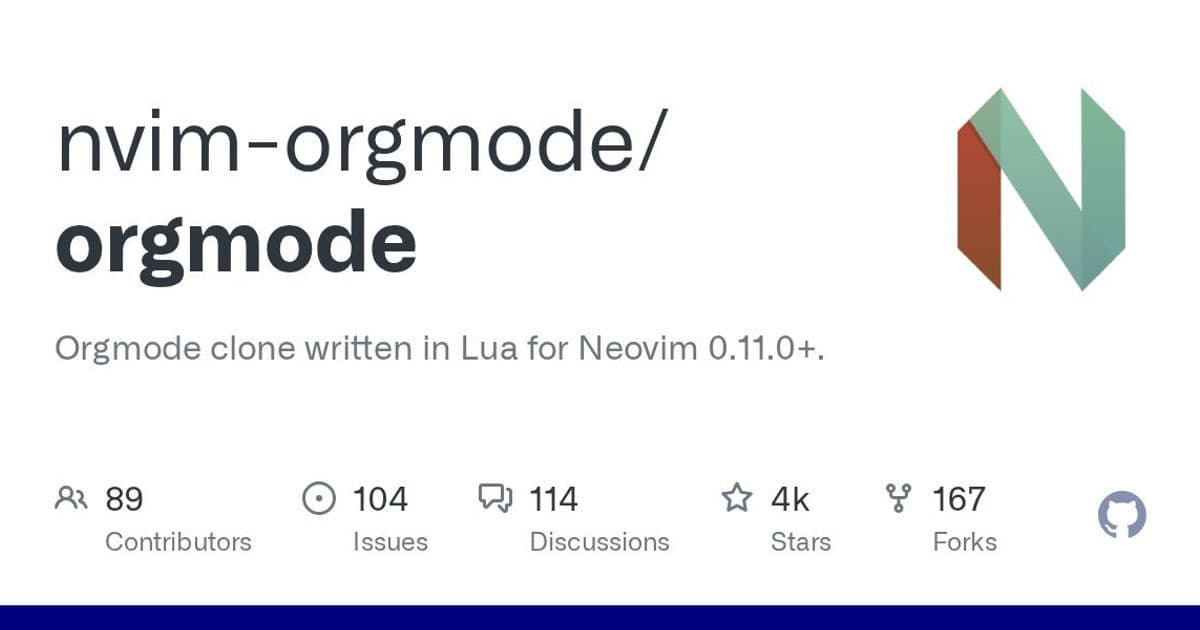A groundbreaking Lua implementation of Orgmode now powers Neovim, offering developers a native alternative to Emacs' legendary productivity tool with full agenda, capture, and time-tracking capabilities.
For decades, Emacs' Orgmode has been the undisputed champion of productivity for developers and knowledge workers. Its powerful combination of note-taking, task management, and time-tracking has created a cult following among those willing to embrace Emacs' steep learning curve. Now, with the explosive growth of Neovim, a significant gap has existed: how to replicate Orgmode's functionality in a modern, lightweight editor. Enter nvim-orgmode, a revolutionary project that ports Orgmode's core features to Neovim using pure Lua, closing a critical productivity gap for the new generation of developers.
Born from the community's demand for a native solution, nvim-orgmode isn't just another port—it's a ground-up rewrite leveraging Neovim's modern architecture. The project requires Neovim 0.11.0 or later, reflecting its commitment to cutting-edge editor capabilities. Installation is streamlined through popular package managers like lazy.nvim, with a simple configuration pointing to your org files:
{
'nvim-orgmode/orgmode',
event = 'VeryLazy',
ft = { 'org' },
config = function()
-- Setup orgmode
require('orgmode').setup({
org_agenda_files = '~/orgfiles/**/*',
org_default_notes_file = '~/orgfiles/refile.org',
})
end,
}
At its core, nvim-orgmode delivers the holy trinity of Orgmode productivity: Agenda, Capture, and Clocking. The agenda view (<Leader>oa) is a powerhouse, offering daily/weekly/monthly/yearly perspectives with sophisticated date handling. It supports complex date ranges (<2021-06-11 Fri 11:00-12:30>), repeater types (+1w, ++1w, .+1w), and deadline warnings (<2021-06-11 Fri 11:00 -1d>). Tasks are intelligently sorted by DEADLINE, SCHEDULED, and plain dates, with navigation between views and quick access to source tasks.
The capture system (<Leader>oc) enables rapid note-taking with customizable templates and seamless refiling to designated files. Clocking time is fully implemented, allowing developers to track time directly against tasks within their editor. Beyond these pillars, the plugin offers:
- Search & Organization: Tag-based searches, keyword lookups, and property-based filtering
- File Management: Headline promotion/demotion, TODO state cycling, checkbox toggling, and archiving
- Export Capabilities: Support for Emacs, Pandoc, and custom export pipelines
- Calendar Integration: Pop-up calendar for date manipulation
- Code Highlighting: Syntax highlighting for source blocks within org files
What sets nvim-orgmode apart is its architectural elegance. By rewriting Orgmode in Lua, the project leverages Neovim's async capabilities and modern plugin ecosystem. The integration with Treesitter ensures robust syntax parsing, while the plugin's modular design encourages community extensions—a stark contrast to Emacs' monolithic approach. As noted in the project's philosophy: "Anything that’s a separate plugin in Emacs Orgmode should be a separate plugin in here." This philosophy fosters a vibrant plugin ecosystem while maintaining a lean core.
The implications for developer workflows are profound. Neovim users can now enjoy Orgmode's legendary productivity without leaving their preferred editor or sacrificing performance. The experimental notification system hints at deeper OS integration possibilities, while the support for repeatable mappings via vim-repeat ensures muscle memory compatibility for Emacs migrants.
For developers standing at the crossroads of editor choices, nvim-orgmode bridges a critical divide. It honors Orgmode's proven methodologies while embracing the modern Lua revolution in Neovim. As the project matures—with community contributions flowing from vim-dotoo and emacs-orgmode—it's poised to become not just a port, but the new standard for integrated productivity in the Neovim ecosystem. The future of note-taking and task management has arrived, and it's written in Lua.

Comments
Please log in or register to join the discussion